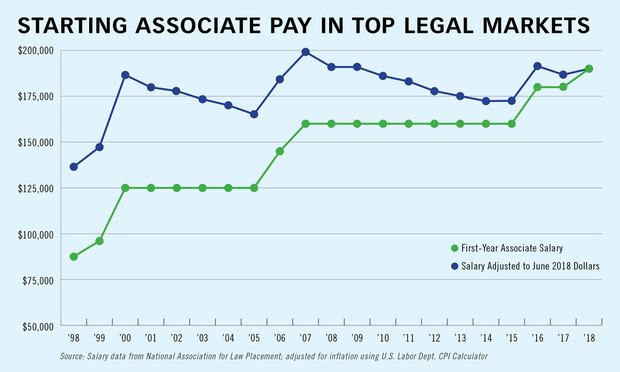Despite Salary Hikes, Inflation Leaves Associate Pay Below Pre-Recession Level
How have associate salary increases kept up with inflation over time, and where does that analysis place the high point for first-year associate pay? Hint: It's not 2018, even with many firms now offering $190,000.
August 22, 2018 at 06:43 PM
4 minute read

Law firms have bumped up starting salaries for associates at top firms over the past few years, prompting Big Law clients to raise a stink about outsized salaries for junior lawyers. But it turns out that this pay—increased to $190,000 this year for lawyers fresh out of law school in big markets such as New York—falls short of past peaks when inflation is taken into account.
Adjusting for inflation with the U.S. Labor Department's consumer price index calculator, even the recent hikes leave today's first-year associates with a lower starting salary than their counterparts who entered the industry just before the global recession, according to an ALM analysis of pay data drawn from the National Association for Law Placement (NALP).
An examination of the prevailing first-year associate salaries over the past 20 years, using New York as a stand-in for the legal industry's top-paying markets, showed that the buying power of an associate's pay peaked in 2007. That year, top firms raised starting salaries for first-year associates to $160,000 from the 2006 rate of $145,000, while before that, first-year starting pay had remained at $125,000 for several years, according to NALP. The $160,000 starting figure then remained steady for nearly a decade—until a 2016 increase to $180,000.
Adjusting 2007's starting salary for inflation, the $160,000 figure becomes $199,185 in June 2018 dollars. That means, in effect, first-year associates earned the equivalent of $9,185 more in 2007 than those who followed the same path in 2018.
Salaries adjusted to June 2018 dollars remained above that $190,000 mark into 2008 and 2009, even as the global recession set in. As the starting associate pay remained at $160,000 for several years starting in 2007, the CPI-adjusted figures steadily dropped until 2015, when they were equivalent to a little more than $172,500 in June 2018 dollars.
Then came an increase to $180,000 in 2016—the equivalent of roughly $191,450 in June 2018—and, eventually, the 2018 hike to $190,000.

Looking at the past 20 years overall, the inflation-adjusted salaries spiked upwards in 2000, 2007 and 2016. The most recent hikes in 2016 and 2018 suggest that associate pay may now be approaching pre-recession levels, even as clients have expressed concern over their law firms jacking up their associate pay scales.
While associate salaries are now rebounding toward pre-recession buying power, that doesn't mean junior lawyers at top firms were suffering during the years without raises. When not adjusted for inflation, the top market salaries for first-year associates increased at a rate that far outstrips gains in median household income across the entire United States.
From 1998 to 2016, median annual household income rose from $38,885 to $59,039, a roughly 52 percent increase, according to the latest available nationwide data from the U.S. Census Bureau.
Over the same span, first-year associates went from earning $87,500 in 1998 to $180,000 in 2016, an increase of nearly 106 percent. Since 2016, starting pay has risen another 5.6 percent in light of the $10,000 raise in 2018.
Setting salary aside, other recent indicators have also pointed to good times for junior lawyers entering the field and for the firms that might hire them. Late last week, for instance, Citi Private Bank's Law Firm Group reported that the legal sector had its best half-year since before the recession, with revenue increasing 5.5 percent in the first half of 2018.
On the employment front, placement results for new law school graduates have also moved toward pre-recession levels—for the class of 2017, more than 88 percent of new law graduates found employment, according to a NALP report in early August.
“Barring another economic slowdown or interruption and barring a significant jump in law school enrollment as a result of rising applications, the employment outlook for recent law graduates looks brighter (if not exactly rosy) than it has at any time since 2008,” NALP executive director James Leipold said in a statement earlier this month. “That is good news.”
This content has been archived. It is available through our partners, LexisNexis® and Bloomberg Law.
To view this content, please continue to their sites.
Not a Lexis Subscriber?
Subscribe Now
Not a Bloomberg Law Subscriber?
Subscribe Now
NOT FOR REPRINT
© 2025 ALM Global, LLC, All Rights Reserved. Request academic re-use from www.copyright.com. All other uses, submit a request to [email protected]. For more information visit Asset & Logo Licensing.
You Might Like
View All
Law Firms Look to Gen Z for AI Skills, as 'Data Becomes the Oil of Legal'

Losses Mount at Morris Manning, but Departing Ex-Chair Stays Bullish About His Old Firm's Future
5 minute read

KPMG's Bid to Practice Law in U.S. on Indefinite Hold, as Arizona Justices Exercise Caution
Trending Stories
- 1Uber Files RICO Suit Against Plaintiff-Side Firms Alleging Fraudulent Injury Claims
- 2The Law Firm Disrupted: Scrutinizing the Elephant More Than the Mouse
- 3Inherent Diminished Value Damages Unavailable to 3rd-Party Claimants, Court Says
- 4Pa. Defense Firm Sued by Client Over Ex-Eagles Player's $43.5M Med Mal Win
- 5Losses Mount at Morris Manning, but Departing Ex-Chair Stays Bullish About His Old Firm's Future
Who Got The Work
J. Brugh Lower of Gibbons has entered an appearance for industrial equipment supplier Devco Corporation in a pending trademark infringement lawsuit. The suit, accusing the defendant of selling knock-off Graco products, was filed Dec. 18 in New Jersey District Court by Rivkin Radler on behalf of Graco Inc. and Graco Minnesota. The case, assigned to U.S. District Judge Zahid N. Quraishi, is 3:24-cv-11294, Graco Inc. et al v. Devco Corporation.
Who Got The Work
Rebecca Maller-Stein and Kent A. Yalowitz of Arnold & Porter Kaye Scholer have entered their appearances for Hanaco Venture Capital and its executives, Lior Prosor and David Frankel, in a pending securities lawsuit. The action, filed on Dec. 24 in New York Southern District Court by Zell, Aron & Co. on behalf of Goldeneye Advisors, accuses the defendants of negligently and fraudulently managing the plaintiff's $1 million investment. The case, assigned to U.S. District Judge Vernon S. Broderick, is 1:24-cv-09918, Goldeneye Advisors, LLC v. Hanaco Venture Capital, Ltd. et al.
Who Got The Work
Attorneys from A&O Shearman has stepped in as defense counsel for Toronto-Dominion Bank and other defendants in a pending securities class action. The suit, filed Dec. 11 in New York Southern District Court by Bleichmar Fonti & Auld, accuses the defendants of concealing the bank's 'pervasive' deficiencies in regards to its compliance with the Bank Secrecy Act and the quality of its anti-money laundering controls. The case, assigned to U.S. District Judge Arun Subramanian, is 1:24-cv-09445, Gonzalez v. The Toronto-Dominion Bank et al.
Who Got The Work
Crown Castle International, a Pennsylvania company providing shared communications infrastructure, has turned to Luke D. Wolf of Gordon Rees Scully Mansukhani to fend off a pending breach-of-contract lawsuit. The court action, filed Nov. 25 in Michigan Eastern District Court by Hooper Hathaway PC on behalf of The Town Residences LLC, accuses Crown Castle of failing to transfer approximately $30,000 in utility payments from T-Mobile in breach of a roof-top lease and assignment agreement. The case, assigned to U.S. District Judge Susan K. Declercq, is 2:24-cv-13131, The Town Residences LLC v. T-Mobile US, Inc. et al.
Who Got The Work
Wilfred P. Coronato and Daniel M. Schwartz of McCarter & English have stepped in as defense counsel to Electrolux Home Products Inc. in a pending product liability lawsuit. The court action, filed Nov. 26 in New York Eastern District Court by Poulos Lopiccolo PC and Nagel Rice LLP on behalf of David Stern, alleges that the defendant's refrigerators’ drawers and shelving repeatedly break and fall apart within months after purchase. The case, assigned to U.S. District Judge Joan M. Azrack, is 2:24-cv-08204, Stern v. Electrolux Home Products, Inc.
Featured Firms
Law Offices of Gary Martin Hays & Associates, P.C.
(470) 294-1674
Law Offices of Mark E. Salomone
(857) 444-6468
Smith & Hassler
(713) 739-1250










